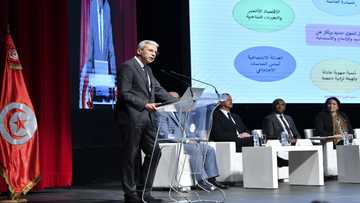Germany misses 2022 climate target on Ukraine war fallout

Source: AFP
PAY ATTENTION: Enjoy reading our stories? Join YEN.com.gh's Telegram channel for more!
Germany used more renewable energy than ever in 2022 but again failed to reach its CO2-reduction goal as Russia's war in Ukraine prompted a return to more coal and oil use, a think tank reported Wednesday.
Europe's biggest economy emitted 761 million tonnes of greenhouse gases last year, just one tonne fewer than in 2021 and overshooting the target of 756 million tonnes, the energy think tank Agora Energiewende said in a statement.
"CO2 emissions are stagnating at a high level, despite significantly lower energy consumption by households and industry," said Agora's Germany director Simon Mueller.
"This is an alarm signal with regard to climate targets," he added.
The German government had aimed to reduce carbon dioxide emissions by 40 percent by 2020 compared with 1990 levels, but has yet to achieve the feat.
For 2022, Germany managed a 39-percent reduction from 1990 levels, Agora calculated.
PAY ATTENTION: Сheck out news that is picked exactly for YOU ➡️ find “Recommended for you” block on the home page and enjoy!
The setback comes despite a record 4.7 percent drop in energy consumption last year, partly in response to soaring fuel prices because of the war in Ukraine.
But the energy saving gains were wiped out by the government's decision to burn more coal and oil to make up for the loss of Russian natural gas deliveries, Agora said.
The turn to fossil fuels also overshadowed another milestone: renewables accounted for 46 percent of Germany's power supply mix last year, an all-time high.
The increase was mainly down to favourable weather conditions for wind and solar power, Agora said.
Chancellor Olaf Scholz has stressed repeatedly that the return to fossil fuels is a temporary measure sparked by an energy crisis, and that his government remains committed to combatting global warming.
Germany still aims to phase out coal-fired power plants by 2030 and become carbon neutral by 2045.
But Agora said Berlin needed to drastically ramp up the expansion of renewables this year.
To meet key targets set for 2030, Germany would have to double its solar energy production and more than triple wind power capacity.
New feature: Сheck out news that is picked for YOU ➡️ find “Recommended for you” block on the home page and enjoy!
Source: AFP



